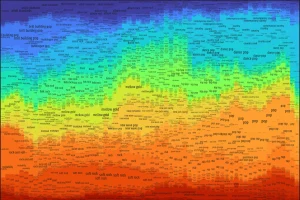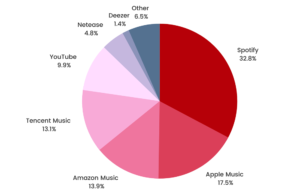In the fast-paced world of the music industry, major record labels are perpetually seeking innovative strategies to outshine the competition. To keep their finger on the pulse, they have turned to the expertise of data specialists in the quest to foresee the future of music.
Data experts can use a variety of tools and techniques to analyze data about music consumption, trends, and demographics. This data can then be used to identify potential new artists, predict which songs are likely to be successful, and target marketing campaigns to specific audiences.
For example, data experts can use streaming data to identify artists who are gaining popularity. They can then use this information to sign these artists to record deals or to promote their music. Data experts can also use social media data to track which songs are being talked about the most. This information can then be used to identify songs that are likely to become hits.

In addition to identifying new artists and songs, data experts can also be used to predict future trends in music. Data experts can use data about music sales to track which genres are becoming more popular. They can then use this information to sign artists who are working in these genres or to promote music in these genres.
Major record labels are increasingly hiring data experts to help them predict the future of music. This is because data experts can provide valuable insights that can help labels make better decisions about signing artists, promoting music, and targeting marketing campaigns.
Universal Music Group (UMG) uses data to identify emerging trends, such as the growing demand for Latin music. Sony Music Entertainment (SME) tracks artist performance, focusing on a strong social media presence. Warner Music Group (WMG) identifies growth opportunities, investing in their own music streaming service, Tidal.
Overall, the major labels are using data to gain a competitive edge in. By using data to predict the future, labels can make better decisions about signing artists, promoting music, and targeting marketing campaigns. This can help them stay ahead of the curve and continue to be successful in the ever-changing music industry.

Furthermore, data experts can also contribute in the following areas:
- Analyze the impact of new technologies on the music industry: Data experts can use data to track the adoption of new technologies, such as streaming and digital downloads. This information can then be used to predict how these technologies will impact the music industry in the future.
- Measure the effectiveness of marketing campaigns: Data experts can use data to track the results of marketing campaigns, such as how many people clicked on a link or how many people bought a song. This information can then be used to improve the effectiveness of future marketing campaigns.
- Develop new business models: Data experts can use data to identify new opportunities for the music industry. For example, data experts could use data to develop a new business model for selling music that is more appealing to consumers.
By embracing data, these major record labels are like mad scientists concocting the perfect music formula. But let’s not forget the potential downsides. They run the risk of turning music into a soulless, cookie-cutter factory, where artists are chosen solely based on data points. We don’t want a world where every song sounds like a robotic rendition of “Twinkle, Twinkle, Little Star.” Let’s not forget that music is an art, not a mathematical equation.
When record labels rely solely on data-driven insights, they risk missing out on the hidden treasures—the oddballs and the musical misfits who defy genre norms. Imagine a world where only generic pop hits dominate the airwaves, and there’s no room for the wacky accordion soloists or the kazoo virtuosos. Hello Weird Al!
The major record labels have discovered the secret sauce to success in the ever-changing music industry: data experts who navigate the digital landscape with unparalleled finesse. These statistical mavens are moonwalking through the data sets, spinning correlations like nobody’s business. So next time you’re enjoying your favorite tunes, remember to give a shoutout to those data-savvy dweebs who are keeping the industry grooving. They’ve proven that when it comes to predicting the beats of tomorrow, nothing hits the high notes quite like a well-timed statistical boogaloo. Keep on rocking, you crazy quants!


